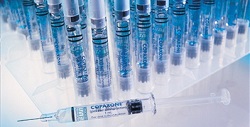 After eyeing Teva Pharmaceutical Industries for marketing violations for more than a year, the Justice Department decided not to join a False Claims Act case against the compnay. But the whistleblowers are persisting with their allegations that Teva used kickbacks, disguised as speaking fees, to persuade doctors to boost prescriptions of its multiple sclerosis drug Copaxone and Parkinson's med Azilect.
After eyeing Teva Pharmaceutical Industries for marketing violations for more than a year, the Justice Department decided not to join a False Claims Act case against the compnay. But the whistleblowers are persisting with their allegations that Teva used kickbacks, disguised as speaking fees, to persuade doctors to boost prescriptions of its multiple sclerosis drug Copaxone and Parkinson's med Azilect.
In a lawsuit unsealed earlier this month, two sales reps-turned-whistleblowers accuse Teva of running "sham" speaker programs and events as a way of paying doctors to prescribe its drugs. They're suing the company on behalf of the U.S. government and 29 states, the lawsuit says.
Like other recent whistleblower claims, this suit cites honoraria paid for presentations never made and events that didn't take place at all. Unlike some other whistleblower claims, this one cites some fairly recent examples, and both whistleblowers are still employed at Teva.
According to the whistleblowers, doctors who didn't increase their Copaxone or Azilect scripts--or continue prescribing at a high level--were tossed off the list of speakers. To get back into the speakers' bureau, doctors had to take part in "training" and write more prescriptions, the suit says: "As Teva's management expressly directed, only those physicians who wrote more prescriptions would be allowed to participate in the speaker programs."
And one of the aims of the recent programs appears to be fighting off competition from Biogen's ($BIIB) new MS pill Tecfidera, which quickly grabbed market share when it was introduced in 2013. Physicians who were big prescribers were paid to go to dinner with docs who weren't as active. One dinner, in April 2013, teamed a big prescriber with another Copaxone doctor-speaker who'd been using Tecfidera with his patients.
"The purpose of the program was not educational," the lawsuit states, adding that the big prescriber, Dr. O.K., "sought to encourage Dr. D.M. to maintain his Copaxone prescriptions and slow down in Tecfidera prescriptions." And according to the suit, Dr. O.K. was collecting about $216,000 per year in Teva speaking fees.
Teva higher-ups talked up the speaker programs--dubbed "Allied Health Media"--at sales meetings, the lawsuit claims. "AHMs, AHMs, AHMs--this is the closest thing I have to a silver bullet," one manager said at a 2011 meeting. And the strategy continues, with Teva paying physicians $1,500 to $2,700 per event to present the same speaker program over and over, with no updates to the presentation materials "in a number of years," the suit claims.
In an emailed statement, Teva pointed out that the whistleblower suit is a civil case and that the federal government has decided not to take any action itself. "Over the past year, the U.S. Attorney's office in Southern New York has been conducting an investigation and Teva has cooperated with all aspects of this investigation," a company spokeswoman said. "The government investigation is now complete and we are pleased that the government has declined to participate further in this matter."
- read the whistleblowers' complaint here and here (PDF)
Special Reports: Top 15 pharma companies by 2014 revenue - Teva | Top 10 patent losses of 2015 - Copaxone | Top 10 drug brands by payments to doctors
Editor's note: This story was corrected to show that the U.S. Justice Department declined to join the whistleblower lawsuit, which is now a civil case. It also adds comments from Teva.